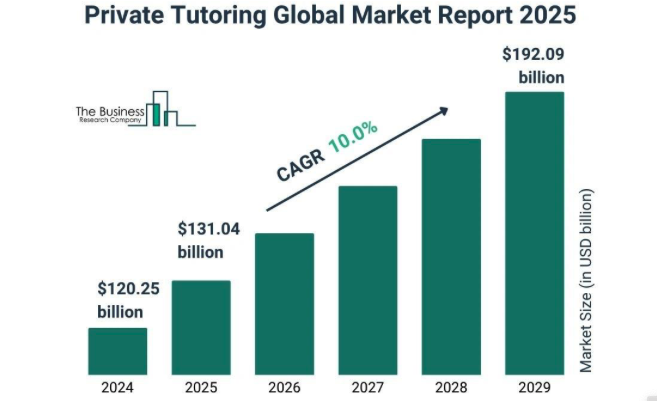Private tutoring remains a booming industry in the United States, with hourly rates in 2025 ranging from $25 to $80. Analysts expect the U.S. tutoring market to grow by $28 billion between 2025 and 2029. [1]
Tutoring costs vary widely depending on who you hire. Individual tutors typically charge $15 to $75 per hour, while tutoring companies may charge $25 to $125 per hour. Highly specialized tutors, such as those offering SAT/ACT prep or advanced STEM coaching, can command even better rates, such as hourly tutoring charges in the neighborhood of $150 or such.
Even though, location is a major factor, a tutor’s skills, teaching style, and track record also affect rates. For example, students in Kansas pay around $38 per hour, while Seattle students pay closer to $65.

Image Source: The Business Research Company
This article explains these dynamics to help tutors set fair prices and guide students in choosing the right educational support. Understanding these dynamics helps tutors set fair rates and helps students choose the right support.
Average Tutoring Rates in 2025
Let us dive deep into what is currently being charged across the industry. Several data points provide insight into the tutoring landscape:
- Private sessions: $25 – $80/hour [2]
- Subject difficulty: Math tutors charge $30 – $60/hour, chemistry tutors up to $75 [3].
- Language lessons: Spanish/French lessons cost about $27.50/hour; Mandarin can reach $75 [3].
- Education level:
- Elementary school: $23 – $75/hour
- Middle school: $25 – $88/hour
- High school: $30 – $100/hour
- College-level: $60 – $110/hour [2]
- Test prep: Premium pricing—$45 – $100/hour, with SAT/ACT prep starting at $100 [4].
- Location impact: Seattle tutors average $55 – $65/hour, Kansas City $40 – $48 [3].
- Online vs. in-person: Online tutoring costs $25 – $50/hour, while in-person tutoring ranges from $40 – $90 [5][6]. The lower cost of online tutoring comes from more than just reduced travel expenses. Tutors save time and money by eliminating commuting, which lets them offer more sessions each day. Students benefit from flexible scheduling, often fitting lessons into evenings or weekends without extra fees. This efficiency helps keep prices lower while still providing quality instruction.
Key Factors That Influence Rates
Tutoring rates are shaped by more than just the subject being taught or where you live. A variety of personal and market-driven factors play a role in what tutors charge. From qualifications and specialized expertise to session format and demand for certain subjects, these elements can significantly raise or lower the final price. Below are the key factors that most influence tutoring rates:
- Tutor Credentials: Tutors with teaching certifications or advanced degrees often earn up to 45% more than college students offering tutoring [5]. Many professionals charge $50 – $120/hour [7].
- Specialized Needs: Tutors with expertise in learning differences (ADHD, dyslexia, autism) usually charge higher fees [1].
- Proven Results: Tutors with a strong record of improving test scores often charge $60 – $150/hour [7].
- Session Format:
- One-on-one: $30 – $90/hour
- Small groups: Less than one-third the cost per student, while retaining ~80% of the benefits [5].
- Market Demand: AP-level STEM subjects and test prep can add $15 – $25/hour to standard rates [5].
- Timing & Attention: Tutors with fewer clients often charge more for their extra availability and personalized focus [7].
Setting or Choosing a Fair Rate
Whether you’re a tutor or a student, setting a fair price requires strategy, consideration of current market trends, and your personal motivation of whether you are in the tutoring business to position yourself as a money-mongering tutor or a tutor who loves to teach and also charges fairly. Tutors must keep in mind that not all students are equal, and they should consider the human factor as a part of their pricing based on students’ ability to pay.
For tutors, start by calculating income goals. If you want to earn an extra $1,000 per month, divide this target by the number of hours you can teach to determine a baseline rate. Adjust gradually as you build experience—sudden price hikes can scare off students.
Remember, clients value time spent teaching, not prep or commuting time. This is why online tutoring is so cost-effective—it eliminates travel and maximizes billable hours.
Let us now present a practical formula to assist tutors in developing a well-structured pricing model. For those new to tutoring, leveraging your academic achievements can help compensate for limited professional experience and justify competitive pricing.
Final Hourly Rate = (Average Market Base Pay) + (Experience Premium) + (Subject Specialization Premium) + (Location Multiplier)
This approach ensures that your rate reflects both market standards and the unique value you bring as a tutor.
Example:
A Boston AP Chemistry tutor might calculate:
$20 (base) + $15 (experience) + $10 (subject) + $10 (location) = $55/hour
Students should research local market rates [12], compare tutors, and look for cost-saving options, for example:
- Package deals: 10 sessions for $450 (vs. $500 individually)
- Subscriptions: $39.99/month for 1 hour or $179.99/month for 5 hours
- Negotiation: Many tutors are open to discounts for recurring sessions
Platforms like Kapdec.com make it easy for students to compare flexible pricing plans, as offered by tutors.
Conclusion
In 2025, most tutoring sessions fall in the $25 – $80/hour range, but rates vary by subject, tutor credentials, location, and session format.
Urban areas are more expensive than rural ones, and online sessions remain the most affordable option. Students needing long-term support can save money with packages and subscriptions.
Tutors should price their services thoughtfully, balancing expertise, time, and market demand. Students should research before committing to a tutor to ensure they’re getting value for money.
Ultimately, the right tutoring rate should strike a fair balance between quality education and affordability—helping students succeed without breaking the bank.
FAQs
Q1: What is the average hourly rate for tutoring in 2025?
Most private tutors charge between $25 and $80/hour, but rates vary based on experience, subject, and location.
Q2: Do rates increase with education level?
Yes. Elementary school tutoring averages $23–$75/hour, while college-level tutoring can cost $60–$110/hour.
Q3: Are online sessions cheaper?
Typically yes—$25–$50/hour online vs. $40–$90 for in-person, based on various market inputs.
Q4: How much do specialized subjects cost?
Math tutoring costs $30–$60/hour, chemistry up to $75, and SAT/ACT prep often starts at $100/hour.
Q5: What should I consider when setting or choosing a rate?
Consider the tutor’s credentials, subject difficulty, session type, location, and market demand.


